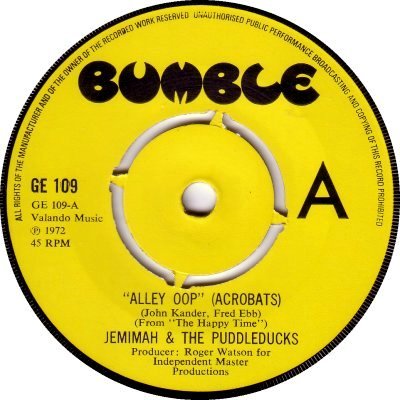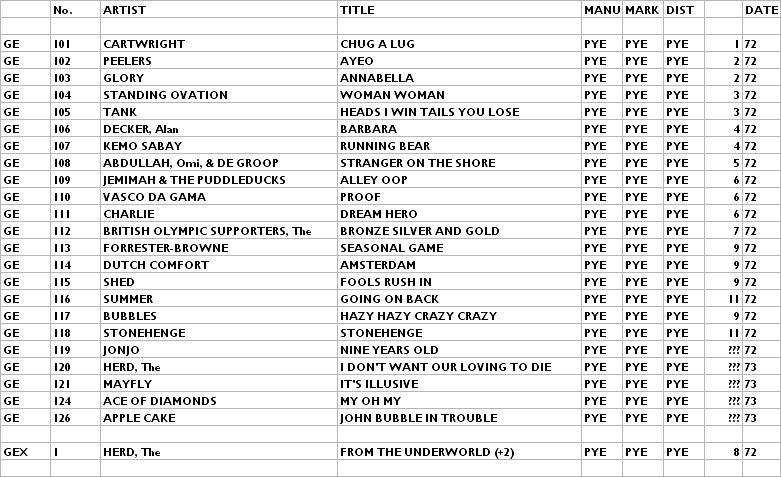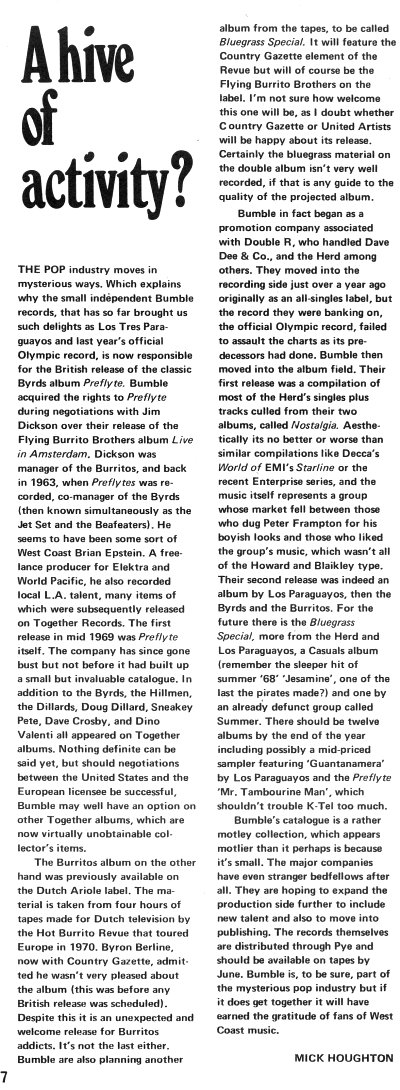

This particular Bumble began life as a production company, with links to Steve Rowland's and Ronnie Oppenheimer's Double R Productions. Under Oppenheimer it started issuing its own records in January 1972. 'Record Retailer' of the 15th of that month carried news of the impending launch: the label was operating out of premises at 64 Oxford Street, and its records would be handled by Pye. Its first single, GS-101, was due out on the 25th; GES-102 and 103 were to follow on the 11th of February. The singles duly emerged, but their catalogue prefix was 'GE' rather than 'GS' or 'GES'. February brought news of a link with the Benelux countries, via Ariola: according to 'Billboard' of the 26th of February the deal was a three-year one, calling for 20 singles a year. It would appear that material flowed in both directions as several singles from those countries came out on Bumble here, starting with one by Alan Decker, 'Barbara' b/w 'June 26' (GE-106; 4/72). At first Bumble concentrated on issuing singles, but in its issue of the 7th of October 1972 'Music Week' reported that the company was venturing into the album market. It added that new singles were in the pipeline, by Bubbles and Stonehenge, with a Christmas single by Ray Teret, 'Nine Years Old', to follow - when it came out, that last record was credited to 'Jonjo'. Label manager John Junior bought Bumble from Oppenheimer in December 1972 ('MW', 16th December), by which point the company's address was Flat 312, Park West, London W2, but he seems to have been unable to make a success of the label. The last reference to it in 'Billboard' came on the 10th of November 1973 when it was referred to as being still with Pye; it seems to have expired not long afterwards.
Bumble issued around twenty-three singles, together with one three-track maxi-single and four LPs; catalogue numbers of those singles reached GE-126 but a few of the later ones appear not to have been used. It kept the same label design from start to finish. None of its products are all that commonly met-with nowadays. Some of its records were reissues: for example, a couple of singles and an LP by the Herd, which originated with Double R, and an LP by The Byrds, 'Preflyte' (GEXP-8001). Quite a few were listed as being 'Produced by Roger Watson for Independent Master Productions'. Several boasted the involvement of Barry Green, who was soon to have hits as 'Barry Blue', while others came via the Benelux connection. Home-grown material seems to have leaned towards straight Pop and novelty items, such as four-year old Jemimah's version of 'Alley Oop', recorded with the help of the Puddleducks (GE-109; 6/72); though Stonehenge's 'Stonehenge' (GE-118; 11/72) is a slow, fairly heavy, instrumental licensed from Library firm DeWolfe. Many companies marked the 'A' sides of their singles with a large 'A', but as far as I can recall only Bumble marked the 'B' sides with a large 'B' (2). Pressing and distribution appear to have been by Pye throughout; there were still a number of Bumble records listed in that company's catalogue for 1974. There was a short article about Bumble in the 'Let It Rock' magazine of June 1973: for the sake of interest I have put it below the discography. Despite its upbeat tone, by the time the article was published the company's prospects must have been looking doubtful, and the various planned future LP releases that are mentioned never happened.




Copyright 2008 Robert Lyons.

